|
|
|
Sort Order |
|
|
|
Items / Page
|
|
|
|
|
|
|
| Srl | Item |
| 1 |
ID:
146153
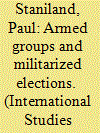

|
|
|
|
|
| Summary/Abstract |
Nonstate armed groups are often involved in electoral violence, but we know little about the origins or fates of these groups. This article develops an interactive theory of relations between governments and electoral armed groups. Governments assign different political roles to armed groups that reflect their ideological position and electoral value. State strategies flow from these political roles, but groups’ organizational capacity can allow them to resist government efforts to control, destroy, or incorporate them. The interaction of regime political interests and armed group autonomy leads to five distinct government-armed group trajectories, ranging from incorporation to violent conflict. I use comparative evidence from militarized elections in Karachi to illustrate the validity of the concepts and assess the power of the theory, while also exploring its limits and the need for future research. My argument and findings matter for our understanding of the linkages between democracy, civil conflict, and state power.
|
|
|
|
|
|
|
|
|
|
|
|
|
|
|
|
| 2 |
ID:
146154
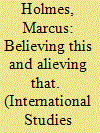

|
|
|
|
|
| Summary/Abstract |
Rationalist models of decision making typically follow the general form of desire + belief = action. But determining an actor's beliefs and desires often proves challenging. One set of theories turns to psychology—and in particular emotions—to uncover how emotions help to shape and strengthen beliefs. Some of this work establishes a fit between emotions and the rationalist paradigm. It holds that emotions account for more than irrational behaviors; they also serve as a source of rational belief. Feeling, it claims, is believing. I argue that if actors belive in the reasonability of their feelings, then this move is warranted. But a range of behavior defies this logic. Instead, I suggest that actors often find themselves torn between contradictory affective intuitions, on the one hand, and rational beliefs, on the other. In consequence, they hold rational beliefs, but their resulting behavior qualifies as irrational. I apply existing work on the distinction between belief and alief to make sense of this phenomenon. I illustrate my claims through a rereading of the security dilemma—where irrational intuitions, in conjunction with rational beliefs, fuel conflict.
|
|
|
|
|
|
|
|
|
|
|
|
|
|
|
|
| 3 |
ID:
146157
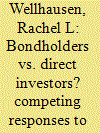

|
|
|
|
|
| Summary/Abstract |
We often presume that international financial actors have the same preferences, but this paper asks whether the property rights of foreign direct investors matter to sovereign bondholders. When governments expropriate direct investors, different investors' preferences could align over property rights issues. However, bondholders likely take positive signals if expropriation generates revenue for the state. Using a novel data set (1995–2011), I find that governments that earn revenue from expropriation can enjoy lower long-term spreads on sovereign bonds. Although governments that expropriate lose out on FDI, they can benefit by generating revenue and enjoying rewards in sovereign debt markets. Unpacking investor preferences thus reveals gaps in market-based informal property rights enforcement. When bondholders' and direct investors' preferences conflict, governments gain space to prioritize other goals over the protection of private property.
|
|
|
|
|
|
|
|
|
|
|
|
|
|
|
|
| 4 |
ID:
146159
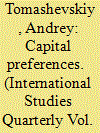

|
|
|
|
|
| Summary/Abstract |
Many argue that government partisanship influences the size of investment flows into stocks and bonds. But existing literature tells us little about how international capital flows influence election outcomes. I argue that passive investment into stocks, bonds, and other debt instruments—in other words, portfolio investments—increases political contributions to right-wing parties. This investment generates resources for domestic capitalists. These owners of capital then channel these resources into political contributions to right-wing parties and enhance those parties' electoral position. Thus, passive investment bolsters the electoral chances of right-wing governments. I illustrate this process with a formal model of special interest politics in which lobbies operate under budget constraint. Using a new data set on political contributions and statistical analyses for a sample of states from 1980–2009, I find support for my general argument.
|
|
|
|
|
|
|
|
|
|
|
|
|
|
|
|
| 5 |
ID:
146151


|
|
|
|
|
| Summary/Abstract |
This article examines the impact of military unit composition on desertion in civil wars. I argue that military units face an increased risk of desertion if they cannot develop norms of cooperation. This is a challenging task in the context of divided and ambiguous individual loyalties found in civil wars. Norms of cooperation emerge, above all, from soldiers sending each other costly signals of their commitment. Social and factional ties also shape these norms, albeit in a more limited fashion. Hence, unit composition can serve as an intervening variable explaining how collective aims can sometimes induce individual soldiers to keep fighting. Analyzing original data from the Spanish Civil War (1936–1939), I demonstrate that three characteristics of a military unit's composition—the presence of conscripts rather than volunteers, social heterogeneity (whose effect is found to be limited to volunteer units), and polarization among factions—increase the individual soldier's propensity to desert. Unit composition proves at least as important as individual characteristics when explaining desertion. This analysis indicates the usefulness of moving beyond commonly used atomistic understandings of combatant behavior. Instead, it suggests the importance of theoretical microfoundations that emphasize norms of cooperation among groups of combatants.
|
|
|
|
|
|
|
|
|
|
|
|
|
|
|
|
| 6 |
ID:
146161
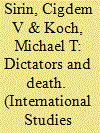

|
|
|
|
|
| Summary/Abstract |
Why are some authoritarian regimes so quick to surrender amid lower numbers of casualties while others prove willing to incur significant casualty counts to continue their war efforts? In this study, we explore the propensity of different authoritarian regime types to sustain casualties in interstate conflicts. We argue that authoritarian leaders with smaller winning coalitions find it easier to distribute the costs of militarized conflicts outside of those coalitions. This diminishes their sensitivity to casualties. Applying a theoretical model based on an inverse divide-the-dollar game (with respect to the distribution of public “bads”), we find that personalist regimes tend to sustain the highest number of casualties in militarized interstate disputes when compared to other autocracies. Our findings suggest that along with the audience cost abilities of an autocratic adversary, target states should also consider an autocratic regime's casualty sensitivity in deciding whether to reciprocate with military action.
|
|
|
|
|
|
|
|
|
|
|
|
|
|
|
|
| 7 |
ID:
146148


|
|
|
|
|
| Summary/Abstract |
In conventional crisis bargaining models, bluffing provides the primary rationale for states to misrepresent their private information, and war occurs because strong states are unable to credibly demonstrate strength to their opponents. Here, I argue that military strategy supplies an alternative reason for states to misrepresent their private information. Both strong and weak states may misrepresent themselves because of the battlefield benefits of fighting against an uninformed opponent, who may choose a suboptimal military strategy. Under appropriate conditions, the military gains for concealing information exceed the diplomatic gains available for revealing that information. Thus, states will choose to keep secrets and fight. To demonstrate this, I incorporate military strategy into the standard bargaining framework, showing that military concerns incentivize both strong and weak states to conceal information, even when they are able to reveal that information costlessly and credibly. As in the usual model, war may occur when states underestimate their adversaries, but it may also occur when states overestimate their adversaries. I further show that a mere willingness to fight does not reveal that a state is strong. I conclude the paper with two brief case studies.
|
|
|
|
|
|
|
|
|
|
|
|
|
|
|
|
| 8 |
ID:
146158


|
|
|
|
|
| Summary/Abstract |
Existing research indicates the interrelated nature of different dimensions of the design of international institutions. In particular, it shows the greater flexibility of deep agreements. We argue—and demonstrate empirically—that the positive relationship between depth and flexibility holds for preferential trade agreements (PTAs). But we add two qualifications to the conventional wisdom that depth and flexibility go hand in hand. First, we argue that the positive relationship between depth and flexibility proves weaker for democracies than for nondemocracies. Second, when making deep agreements more flexible, countries also add strings to the use of the additional flexibility provisions. An original data set on the design of 587 PTAs allows us to test our arguments. Both descriptive evidence and multivariate statistics support the theoretical expectations. The findings contribute to the literatures on the design of international institutions and the causes and consequences of PTAs.
|
|
|
|
|
|
|
|
|
|
|
|
|
|
|
|
| 9 |
ID:
146152
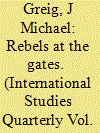

|
|
|
|
|
| Summary/Abstract |
In this paper, I build upon the conflict management, civil war, and bargaining literatures to develop and test a theoretical model that links openings for diplomacy to where civil war battles occur and how these locations change over time. I argue that the locations and movements of civil war battles provide information to both governments and rebels that influences their willingness to engage in mediation and negotiation. By identifying how civil war battles influence the willingness of warring sides to participate in diplomacy, I suggest that it is possible to identify other windows of opportunity for effective conflict management beyond waiting for a conflict to evolve into a hurting stalemate. The results of my analysis of 46 African civil conflicts shows that battle locations, battle velocity, and battle dispersion each influence the occurrence and outcomes of peace talks.
|
|
|
|
|
|
|
|
|
|
|
|
|
|
|
|
| 10 |
ID:
146156


|
|
|
|
|
| Summary/Abstract |
When do states impose sanctions on their rivals? We develop a formal model of domestic power consolidation, threats, escalation, and imposition of sanctions. With complete information, the target regime's consolidation of power determines the result—leaders with stable control can weather sanctions and thus deter their imposition, while vulnerable leaders concede the issue. However, when an imposer is uncertain of a foreign leader's consolidation, vulnerable types have incentive to bluff strength. Foreign powers sometimes respond by imposing sanctions, even though the parties would have resolved the crisis earlier with complete information. We then hypothesize that opponents of newer leaders—particularly in autocracies—are more likely to suffer from this information problem. Employing the Threat and Imposition of Sanctions (TIES) data set and carefully addressing selection problems common to the sanctions literature, we show that sanctioners are indeed more likely to follow through on threats against such leaders.
|
|
|
|
|
|
|
|
|
|
|
|
|
|
|
|
| 11 |
ID:
146163
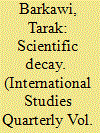

|
|
|
|
|
| Summary/Abstract |
Poznansky (2015) attempts to reconcile democratic-peace theory with US covert operations against elected regimes during the Cold War. In the course of doing so, he exposes both the degenerating character of the democratic-peace research program and its ideological underpinnings in American exceptionalism.
|
|
|
|
|
|
|
|
|
|
|
|
|
|
|
|
| 12 |
ID:
146162


|
|
|
|
|
| Summary/Abstract |
Democratic states sometimes engage in covert interventions—sometimes involving forcible regime change—against other democracies. Critics charge that these interventions raise doubts about the robustness of the “democratic peace.” I argue that they require analysts to rethink some aspects of democratic-peace theory. Democratic states base their behavior toward other democracies on expectations about the future trajectory of their regimes: whether, and to what extent, those states will likely remain democratic in the future. When they expect democracy to persist, the constraints of the democratic peace operate. But when democracies expect another state's democratic character to break down, or decay, they prove more willing to engage in covert forcible regime change. I test my dynamic version of democratic-peace theory by examining US efforts to forcibly depose Iran's Mohammed Mossadegh (1953) and Chile's Salvador Allende (1970–1973). The framework developed here helps to resolve a longstanding anomaly for the democratic peace—secret interventions between democracies—while also providing policymakers with a clearer sense of the stakes associated with covert democracy promotion and subversion.
|
|
|
|
|
|
|
|
|
|
|
|
|
|
|
|
| 13 |
ID:
146155


|
|
|
|
|
| Summary/Abstract |
Individual political rights and civic national identity lie at the core of American democracy, and spreading democracy is a crucial component of American grand strategy. However, American policymakers have often supported the construction of rigid, group-rights-based institutions in ethno-religious conflicts even when the parties were not demanding such institutions. The pursuit of “ethnocratic” solutions not only runs contrary to American ideals, but it is also not pragmatic, in that it enables the creation of regimes that are fragile, divided, and often dependent on outside assistance to maintain peace. This article weighs hypotheses about the sources of foreign policy decision making stemming from three contending Weberian logics of social action: instrumental rationality, normative appropriateness, and habit. Drawing on causal-process observations during crucial decision moments in Bosnia and Iraq, I argue in favor of the plausibility of habit as a driver of U.S. foreign policy. This work furthers the theoretical development of the concept of habit, offers a means of studying social habits empirically, and suggests improvements for American foreign policy in ethnic conflict.
|
|
|
|
|
|
|
|
|
|
|
|
|
|
|
|
| 14 |
ID:
146149


|
|
|
|
|
| Summary/Abstract |
We examine the sector-specific distributive effect of war in the US economy. We argue that war generates sector-specific distributive effects via demand-side and supply-side mechanisms. We also claim that war's distributive effects materialize over time. Our empirical analysis utilizes a panel data set with 22,354 U.S. firms for the period from 1960 to 2007. It probes the impact of the U.S. Government's war making on firm performance in the U.S. arms and non-arms (hybrid and civilian) sectors in both the short and long runs. Our analysis shows that war does not always affect U.S. non-arms sectors adversely. Indeed, war exercises a positive total long-run effect for these sectors. It also finds that the supposedly positive distributive effect of war for U.S. arms sectors proves weaker than analysts generally assume. Finally, it demonstrates that war-induced demand and supply shocks can explain these results. Overall, our research sheds light on a relatively understudied aspect of war and advances the general understanding of the political microeconomy of war making.
|
|
|
|
|
|
|
|
|
|
|
|
|
|
|
|
| 15 |
ID:
146150


|
|
|
|
|
| Summary/Abstract |
Successful management of combatants through disarmament, demobilization, and reintegration (DDR) remains one of the main challenges of post-conflict peacebuilding. While DDR is meant to contribute to a secure post-conflict environment conducive to economic and political development, the success of DDR efforts remains mixed. Unlike previous work focusing on procedural aspects or post-conflict reconstruction and development, we shift the focus to understand microlevel conditions—economic, security, and ethnic concerns—that influence ex-combatants' satisfaction with DDR. We argue that ex-combatant satisfaction with DDR should increase as individual-level economic conditions increase, as security situations improve, and as ethnic tensions decrease. We test our expectations using an original data set collected with field interviews and surveys from 122 ex-combatants in South Sudan in 2011–2012. We find that participants are more satisfied when their income-generating activity is based on DDR job training and when the UN has a large presence in their area. Concerns about political instability and an abundance of firearms make ex-combatants less satisfied with DDR.
|
|
|
|
|
|
|
|
|
|
|
|
|
|
|
|
| 16 |
ID:
146160
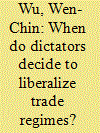

|
|
|
|
|
| Summary/Abstract |
This paper investigates how authoritarian leaders employ trade openness as a response to rising inequality. Based on the Heckscher–Ohlin model of international trade and models of democratic transition, I argue that unskilled laborers in authoritarian regimes can benefit from engaging in international trade, thus becoming more compliant to the authoritarian rules as their countries integrate into the world economy. Therefore, dictators in labor-abundant countries expand trade to neutralize democratization threats initiated by rising inequality. My argument uses supporting data from around eighty authoritarian regimes during the period from 1963 to 2003. I address endogeneity problems with dynamic panel data and instrumental variable regression models in this paper. My analyses suggest that economic globalization helps strengthen authoritarian regimes.
|
|
|
|
|
|
|
|
|
|
|
|
|
|
|
|
|
|
|
|
|